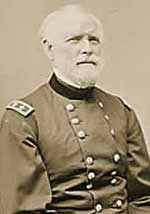William Selby Harney

Amerikansk generalmajor. Anførte en straffe-ekspedition mod Sioux-indianerne.
- Ash Hollow, 1855
William Selby Harney was born on August 27, 1800, at Haysboro, Tennessee, a community on the Cumberland River (a few miles above Nashville) of which no trace remains today. He attended a local academy and in 1818 was commissioned into the Regular Army as a Second Lieutenant of Infantry, with his birthplace and residence for some reason misrepresented in military records as Louisiana (probably because his appointment derived from a Louisiana Congressman, a common practice of day).
He distinguished himself in the Florida Campaigns against the Creeks and Seminoles and rapidly attained promotion. By 1836 was Lieutenant Colonel of the 2nd Dragoons (later the 2nd Cavalry) and in 1846, just prior to the war with Mexico, he became its Colonel. The promotion made him senior Cavalry commander under Winfield Scott in the advance upon Mexico City. Scott distrusted his judgment and relieved him of command. The ensuing imbroglio which resulted in his restoration to command caused a great newspaper fanfare. Scott was overruled by President James K. Polk, a neighbor of the Harney family in Tennessee, and he quickly vindicated his reputation by his gallant conduct at Gerro Gordo, for which he received the brevet of Brigadier General to rank from April 18, 1847.
From then until outbreak of the Civil War, he enhanced his reputation by feats against warring Indians, but diminished it, after his promotion to Brigadier General in the Regular Service, to rank from June 14, 1858, by anti-British activities in the San Juan Island affair, while in command of the Department of Oregon. He was recalled from the latter post, and was in command of Department of the West, with Headquarters at St. Louis, one of the four General officers of the line in the Regular Army when the Civil War began. The others were Brevet Lieutenant General Winfield Scott and Brigadier General John E. Wool and Edwin V. Sumner, who had been appointed to fill a vacancy caused by the dismissal of D. E. Twiggs.
Harney had married into an old St. Louis family and by birthplace and other connections was allied with a pro-Southern element. Confederate Brigadier General Daniel M. Frost was the husband of the niece of Harney's wife. Accordingly, his agreement with Confederate General Sterling Price not to molest the Missouri State Guard so long as it committed no overt act against Federal authority, was viewed with suspicion in Washington, D.C. He was relieved of command and saw no further service.
He retired in 1863, and at close of the Civil War was breveted Major General. He lived in retirement on his estate at Pass Christian, Mississippi, and St. Louis. He died at Orlando, Florida, on May 9, 1899 and was buried with full military honors in Arlington National Cemetery (Section 1, Grave 117). His wife, Mary Elizabeth Harney (January 24, 1826-October 22, 1907), is buried with him.